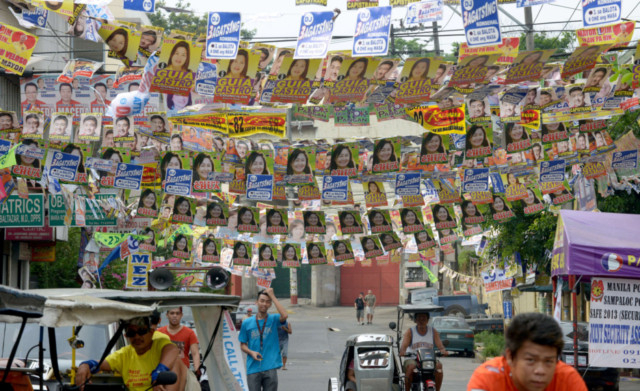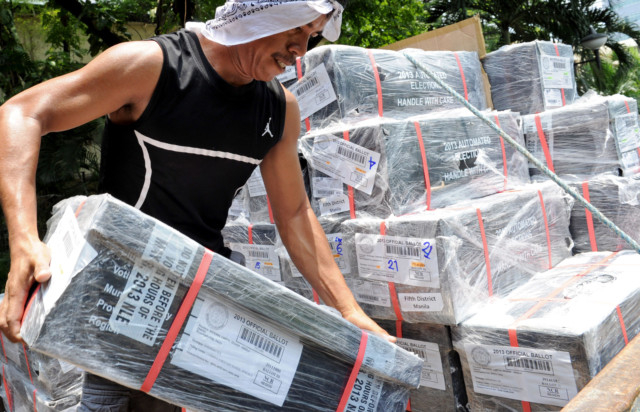
Manila: Supporters of pastor Eddie Villanueva, a senatorial candidate, made a human chain on Manila’s Roxas Boulevard to campaign against traditional politicians.
At the same time, a group called the Movement for Good Governance (MGG), launched a website with a scoreboard to guide voters in “hiring” politicians who are fit for the job they are running for, economics professor Solita Monsod, said in her column in the Inquirer.
The scoreboard has failed well-entrenched politicians, also called “dynasts,” in upholding issues such as empowerment of people and ethics in governance, said Monsod, adding the scoreboard has reached a scientific approximation of what has been debated and agreed upon, for a long time, by the academe and ordinary observers.
“There is a significant relationship between political dynasties and lower per capita incomes, higher incidence of poverty and lower human development indices in local areas,” said Monsod.
“Expectations from Filipino voters during elections has never been this high,” admitted Arlene Lorenzo, a student of the University of the Philippines who is doing research on the development of Filipino voters based on results of Philippine elections.
Some 52 million registered voters will elect 18,022 posts — 12 in the Senate’s 24 seats, 229 in the House of Representatives, local government officials in 80 provinces, 143 cities and 1,491 towns.
These voters will be tested if they “have kicked the habit of selling votes, of being coerced by traditional politicians’ guns and goons, including popularity ratings propped up by corporate support for candidates,” Lorenzo said.
Election organisers have said their main aim is to encourage Filipinos to reach political sensitivity and socio-economic awareness to uphold democracy, a legacy from the United States which ruled the Philippines from 1898 — after more than 300 years of Spanish colonial rule — until the second declaration of independence in 1946.
Prospero de Vera, political analyst and vice-president for public affairs and professor of public administration at the University of the Philippines called for the creation of an independent Campaign Commission that will require all candidates to participate in debates.
Debates should not be done the way it is being done now, said, De Vera, adding the commission-initiated debate should be “done on free television, cost-shared by the country’s TV networks, the academe and the government-run Commission on Elections [Comelec]”.
These debates should reach far flung provinces, poor communities and the social media, and should aim to educate voters in between elections.
De Vera also called for reforms of the country’s current political party system in order to hone candidates “who truly represent constituencies, support significant issues, and have substantial platforms”.
On the eve of the May 13 elections, President Benigno Aquino asked voters for a 12-0 victory for his senatorial team, hinting that his team is composed of the ruling Liberal Party.
Political analyst Alex Magno in his column at the Star, noted that only three senatorial candidates in the Aquino team belong to the LP. Many of them are from the Nationalista Party, LP’s former staunch opponent in the 2010 presidential polls. The rest are from PDP Laban, a party led by Vice-President Jejomar Binay, whose UNA, identified as this year’s minority party, is a coalition of PDP Laban and the group of former president Joseph Estrada.
“The pro-administration coalition is populated by unlikely allies,” said Magno, adding what is going on is “anathema to party politics”.
The alignment of candidates in the May 13 election “does not even contribute to the rebuilding of our political party system. More likely, it undermines the political parties as institutions vital to any representative democracy,” said Magno.
The country’s multi-party system, which began in 1986, has totally erased the much-needed division between the ruling party and the opposition — for checks and balances.
David Balangue, co-vice chair of the National Movement for Free Elections (Namfrel) said in his column at the Inquirer: “We seem to elect the popular rather than the qualified in our executive and legislative branches of government.”
Politicians are also culprits, their attitudes shaped by the country’s erroneous political system, Balangue admitted. He blamed a system of greed in which the countrywide development fund, also called pork barrel, is assigned under the custody of senators.
There are no enabling laws from dynasty-oriented politicians to implement the anti-dynasty provision in the Constitution, said Balangue, adding there are no prosecutions of corrupt government officials.
He forgot that former President Joseph Estrada was convicted of plunder by the Sandiganbayan, an anti-graft court in 2007.
Estrada, a former action star, is running for mayor of Manila, and lionised by thousands of movie-going voters during campaign rallies. His son by a woman other than his wife who is mayor of Merto Manila’s suburban San Juan, is now a senatorial candidate. His other son by his wife Loi is finishing his term at the senate until 2016.













